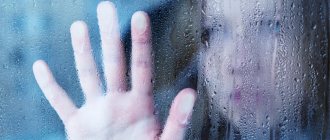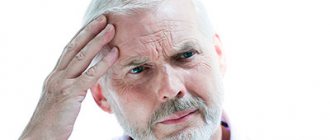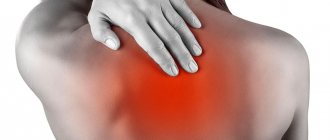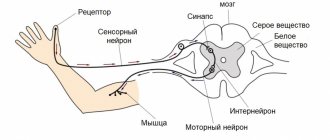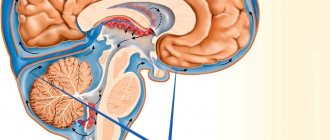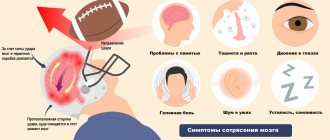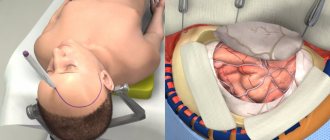What is the “autumn blues” and why does it occur?
— In autumn, mood worsens, primarily for physiological reasons. As soon as daylight hours decrease, the production of serotonin, the hormone responsible for a good mood, decreases. The synthesis of melanin, which is responsible for the sleep/wake cycle, on the contrary, increases. Because of this, it is more difficult to get out of bed in the morning, and during the day there is increased sleepiness, says Veronika Chuprova . – People with a normal psycho-emotional background may not even notice these changes. Those who are exposed to stress and frequent mood swings are more likely to become mopey. People with low self-esteem, melancholic and phlegmatic people are at risk of seasonal deterioration in well-being.
In 90% of cases, the blues go away with the first snow - by this time the person gets used to the new life cycle, and the body adapts to a different mode of operation.
Psychotherapist Veronika Khatskevich identifies another reason for seasonal mood changes - psychological:
“There is no concept of “autumn blues” in clinical psychology,” says Veronika Khatskevich . “It’s not a medical diagnosis, unlike depression. It’s just that after the summer riot of greenery, autumn days look quite gloomy, reminding us of what a person lacks in life - attention, care, love, affection, intimacy, understanding. What matters here is how self-sufficient a person is and can rely on himself.
Another fact: decreasing daylight hours, yellowed leaves and lack of sun are perceived at an unconscious level by a person as a loss. And he lives it with sadness and sadness. At this time, a deterioration in mood and a decrease in vitality is possible, but a person quickly adapts to them. The main thing is not to suppress your feelings, otherwise the blues may drag on and develop into depression.
How to diagnose burnout or blues
If you feel that you have disinhibition, absent-mindedness, weakness, loss of strength, loss of appetite and sleep, belief in your uselessness, self-blame, decreased mood, apathy, pessimism, suicidal thoughts and, most importantly, these symptoms do not stop within two weeks, there is a high probability that you are depressed. In this case, the only way out of this situation is to urgently contact a specialist. Why urgent? Depression is insidious in that it constantly changes the coordinate system. Our brain is designed in such a way that it does not remember our past states, which makes it almost impossible to track the disease on our own. It seems to a person that he has always felt this way, but at the moment he feels bad due to temporary stress or piled-up work tasks - in a word, consciousness deceives us and does not let us know that the condition has sharply worsened. The more time passes, the harder it is to realize that you need help, so it is very important to contact a specialist at the very beginning.
If we talk about self-diagnosis, then any significant change relative to what was before indicates that your emotional state has worsened. When should you go to a specialist? If you experience any kind of dissatisfaction within six months, this is already a reason to seek help. If you notice obvious symptoms of depression, which are increasingly difficult to cope with, then two weeks is enough for self-diagnosis.
It is also important to understand that emotional burnout and the autumn blues can often expose depression, depriving a person of defense mechanisms. This process is easiest to explain using the example of emotional burnout. Let's say you have depression and you cope with it by manic work. You don’t stop for a second so as not to fall into this state, and then suddenly you experience burnout - you can no longer work in the same mode because of your apathy. At this moment, all previous methods of defense fail and the depression that you have had all this time is revealed.
View on Instagram
Depression: concept, symptoms
— Depression is a condition that does not allow a person to live a full life and is characterized by a complete lack of interest in life, a feeling of one’s own uselessness, apathy, loss of strength and energy, and indifference to everything that happens. A depressed person cannot communicate normally with others - he is not interested in company, hobbies, he does not attend public events, trying to spend more time at home alone, continues Veronika Khatskevich. — About 5% of the population suffers from depression, and this disease requires drug therapy.
There are several types of depression:
1) Organic depression occurs due to an acquired or hereditary defect of the central nervous system.
2) Endogenous depression develops due to genetic predisposition.
3) Psychogenic depression occurs as a reaction of the psyche to negative events.
4) Iatrogenic depression - consequences of exposure to any drug.
5) Separately, we can distinguish symptomatic depression associated with changes in hormonal levels - as one of the signs of physical illness and depression caused by long-term alcohol or drug addiction.
If the disease is not treated, it leads to an irreversible process in the brain - neural degeneration occurs.
Important: depression does not only affect adults. It can also be diagnosed during adolescence. Every child feels sad, impressed, angry, angry or annoyed from time to time - this is normal. During the period of growing up and hormonal changes in the body, parents need to be more attentive. If lethargy does not go away even after the child has rested and feels well, I recommend contacting a psychologist or neurologist.
What is depression?
How to distinguish a bad mood from depression?
Depression is a special emotional state that clearly goes beyond ordinary mood swings. The usual low mood and blues go away like fatigue after sleep: a slight volitional effort or a pleasant event (rest, sports training, a date, a delicious dinner, a hobby, shopping, a trip, a salary) quickly changes the mood, the melancholy dissipates, the person switches.
Depression is a disease. It would not occur to anyone to “dispel” a disease (for example, the flu) or switch from it to something else; everyone knows that the disease needs to be treated. If the illness is severe, then hoping that it will go away on its own is naive or even criminal. This fully applies to the disease of depression.
In depression, a person acutely experiences his helplessness, his inability to change anything. Something happened to him, and from a certain moment he became powerless. The experience of this kind of powerlessness, hopelessness, hopelessness constitutes the main content of depressive suffering.
Typical depression cannot do without auto-aggression - self-condemnation, self-accusation, feelings of wrongness of past actions, feelings of one’s own weakness, inferiority, inferiority.
With real depression, as with any illness, access to the volitional resource is lost. In the case of ordinary laziness, a person ultimately gathers his “will into a fist,” “gets down to business,” and then this business itself begins to cause joy and pleasure in him so that will is no longer required. With depression, there is simply nothing to “pull together”, and even more so, there is no ability to enjoy activities.
With typical depression, the ability to experience pleasure as such is lost - this is one of the main signs of depression, called anhedonia . As you know, hedonism is synonymous with love of life, the ability to enjoy life. In a state of depression, a person, on the contrary, cannot experience the emotion of pleasure even when it should be guaranteed to him: his favorite dish is tasteless, acquisitions are meaningless, communication with friends is painful, sex is energy-consuming, a trip that he could once only dream of, exhausting.
Depression is always an intense experience of suffering. Even if we are talking about inner emptiness, indifference, insensibility, all the same, some part of the soul is extremely “sensitive to this insensibility” and suffers from it.
A depressed person feels that for any work he needs to use his last strength, but it still won’t be enough for full-fledged activity. He acutely experiences this inability, and although depression also contains enormous energy, all this energy can only be expressed in suffering from the inability to change anything.
A simple example. A poet experiencing ordinary melancholy can express it in a poem and feel satisfied as a result. A poet experiencing depression is painfully aware of his inability to create any poem and only suffers as a result. It’s the same with a musician, an artist, an accountant writing a report and a worker digging a trench: without depression, they can switch to something else, get out of their blues, melancholy, or transform their energy into creativity, intellectual or physical labor, and when Depression cannot do this.
Symptoms of depression
A psychotherapist or psychiatrist makes a diagnosis if there is a so-called the classic depressive triad: firstly, hypothymia - decreased mood; secondly – mental (ideational) inhibition; thirdly – motor (kinesthetic) inhibition.
The first, a decrease in mood, is experienced very dramatically. This includes almost everything that is meant by melancholy, sadness, apathy, melancholy, depression, despondency, loss of interests, meaning, motivation. Self-confidence and self-esteem fall catastrophically, severe remorse, feelings of guilt, inferiority, insolvency, wrongness of past actions and decisions, self-condemnation, self-abasement and everything else that could be called a pronounced inferiority complex are possible. There is a pronounced restriction of contacts and an emphasized desire for loneliness. With extreme degrees of depression, there are feelings of mental pain, heaviness in the soul, a “stone on the heart,” sensory emptiness, emotional exhaustion, “burnout,” loss of the ability to sympathize and empathize, which almost inevitably leads to thoughts about the meaninglessness of life, unwillingness to live, overthinking suicide scenarios.
However, clinical depression involves far more than this. All of the above - apathy, hopelessness, mental pain, and even thoughts of suicide can temporarily arise in a person experiencing mental trauma of betrayal, financial collapse, loss of loved ones, etc. Changes in the sensory sphere alone do not provide strong grounds for diagnosis. Two more components of the depressive triad need to be confirmed.
The second component is mental retardation. This disorder manifests itself in the fact that a person simply does not have enough energy to perform mental operations in full. Simply put, a depressed writer cannot write, an accountant cannot count, a lecturer cannot speak extemporaneously, at least they cannot do it as freely as they did before depression. Therefore, a diagnosis of depression also implies a decrease in clarity of thinking, a feeling of “fog” in the head, unnaturalness, unnaturalness of what is happening, disconnection from oneself, an inability to concentrate, properly remember and assimilate information, which inevitably leads to a decrease in creative and intellectual abilities. In the experiment, this is confirmed by an objectively recorded decrease in the number of associations per unit of time, so it is no coincidence that depressed patients feel that their “thoughts are flowing slowly.” With severe depression, one of the first complaints is often about memory loss, a decrease in vocabulary, difficulties in constructing phrases and sentences, a feeling of “dullness” up to fears of impending dementia. All this has no organic (neurological) basis and completely disappears when you get out of depression.
The third component is motor retardation. The more severe the depression, the less mobile the person is. (The only exception is the so-called agitated depression, in which a person senselessly rushes “from corner to corner,” like an “animal in a cage,” but even these periods are short-lived.) Motor retardation manifests itself not only by outwardly visible inactivity, but, first of all, of all, an acutely experienced feeling of loss or decrease in volitional abilities, general tone, strength, energy. Even ordinary everyday tasks are performed “through force,” as if by a strong inner urge. And this is not laziness at all - a lazy person can always BUT DOES NOT WANT to do anything - he already feels good, without a shadow of mental suffering he watches how others perform his duties; with depression, on the contrary, a person WANTS, BUT CANNOT be active; he seeks with all his mental strength, but does not find access to the lost volitional resource.
In severe depression, motor retardation reaches the point that patients stop taking care of their appearance, maintaining hygiene, and spend almost all their time lying or sitting, staying in the so-called. melancholic stupor.
Thus, no matter how emotionally a person suffers, if, for example, he reports that during his depression he re-read all of Dostoevsky or wrote an annual report, then this is not depression at all, since the second component is missing - mental retardation. And also - if he notes that his work saves him, that tasks, assignments and important matters can temporarily distract him from painful experiences, then this is not depression at all, since its third component is missing - motor retardation.
It is worth mentioning some other manifestations that characterize depression. We have heard a lot about panic attacks, but few people are aware that with depression, real “anger attacks” are often encountered - episodic outbursts of extreme irritation, impatience, even poorly controlled aggression, which are not characteristic of the character of a given person and completely stop after leaving the depressive state .
With depression, sleep is often disturbed, and not in the form of difficulty falling asleep, as with anxiety neuroses, but in the form of early (at 3-6 am) awakenings in a very painful emotional state without the ability to fall asleep again.
Also, the daily rhythm of mood in depression, as a rule, is typically “owl-like” - in the first half of the day all components of the depressive triad are most pronounced, and in the evening, especially at night, a person seems to “pace”, gaining relatively greater activity and clarity of thinking .
Among the vegetative, or as they also say, psychosomatic symptoms of depression are intestinal constipation, headaches, arterial hypertension and dry mucous membranes, the latter may partly determine such a well-known feature of depressed patients as the inability to cry.
Often, the place of the first component of the depressive triad (decreased mood and corresponding emotional experiences) is taken by multiple complaints about the state of physical health, a feeling of loss of strength as a result of a severe but unrecognized illness, and a belief in the presence of symptoms of somatic pathology with normal examination results. This type of depression is called somatized, or masked, hidden.
There are many types of depression, and each has its own symptoms. A person can either suffer from severe insomnia or experience irresistible drowsiness, a willingness to sleep constantly - both of these occur with depression; he may rush around in a panic, not finding a place for himself, or he may not find the strength to get out of bed to prepare food for himself - both of these are possible with depression; may experience melancholy, sadness, hopelessness, mental heaviness and pain, while clearly realizing that he is physically completely healthy, or, on the contrary, may deny any gloomy and dreary experiences, while feeling physically “a complete wreck”, suffering from a lot of painful sensations all over the body, cursing doctors who are supposedly unable to recognize the disease - and in both cases, of course, depression; You can experience catastrophe, darkness, emptiness, the approach of death within yourself, being fenced off from everyone, closed and passive, or you can perceive all the same things happening outside and be fanatically confident in your premonition of the death of the world, the impending apocalypse, sharing with passionate confidence with others “ revealed knowledge” - both are variants of severe depression.
Depression is anxious, apathetic, melancholic, hypochondriacal, reactive, endogenous, recurrent, psychotic, neurotic, latent, somatized, atypical... A list of classifications of depression alone will take up the space of this article. Under no circumstances should you try to diagnose, let alone treat, depression on your own.
When is it time to contact a specialist?
In countries with developed medicine, there is a rule - if three appeals to doctors of different profiles regarding any disorder did not give a clear result, then the fourth appeal should be to a psychotherapist or psychiatrist.
Why is depression dangerous?
Severe depression is dangerous due to suicide, which can occur at any, most unforeseen moment, and more often, oddly enough, with a temporary improvement in mood, when the patient seems to have “strength and determination” to end a meaningless existence. The number of suicides in the world is staggering - 1 million deaths per year, not counting suicide attempts; in Europe, 60 thousand of them. In Russia, the number of completed suicides exceeds the number of road accident victims.
“Depression is like a stone thrown into the stream of life and impeding its flow,” says the metaphor. Even if a person does not persistently strive to leave life, he is actually deprived of this life itself: vital activity, joy, love, creativity are inaccessible to him. It is also well known that the body does not live separately from the psyche: long-term depression leads to decreased immunity, endocrine disorders, changes in metabolism and body weight, and possibly oncology.
Is “autumn” depression a disease or just the usual blues?
Perhaps both.
Mental illnesses - recurrent depression or bipolar affective disorder (BD), in the old way, manic-depressive psychosis (MDP), are characterized by a clearly defined periodicity - as if some pathological biorhythm turns depression on and off for certain periods of time. But this is not a biorhythm, just cyclicality - a characteristic feature of the course of the disease, which does not care about seasonality or lunar phases. People often talk about spring or autumn exacerbations, but in reality they can occur at any time of the year. Also, the duration of depressive phases is very variable - from several hours to several years.
The usual autumn laziness and blues have nothing to do with illness. This state was beautifully poeticized by A.S. Pushkin, who never suffered from depression: “A sad time, the charm of the eyes, your farewell beauty is pleasant to me...”. It is the healthy emotional sphere that is in constant sensitive connection with everything that happens around, including weather phenomena. Not everyone is a poet; usually we see autumn grey, damp, dirt... To escape from “depression” to some hot country at this time is a very healthy desire.
The well-known “autumn-spring exacerbations”, as a rule, have nothing to do with pathology. For most, autumn is a time of “post-vacation stress”, when someone needs to sharply “get into work”, someone’s mother-in-law drives them to the dacha to collect the harvest, and someone is counting the missing pennies to get the children ready for school... Spring is the time falling in love, increasing hormonal activity, ease in everything - from clothing to behavior. What, if not “depression,” will a lonely person feel in his soul, looking at loving couples melting in the sun? In this sense, we can paraphrase a well-known verse - nature does not have bad weather, but... not everyone has grace in their hearts.
How to treat depression?
Clinically significant depression is treated with antidepressants. If a certain “specialist” instead of an antidepressant uses conversations, hypnosis, training, psychoanalysis, relaxation, neurolinguistic programming, St. John’s wort-based drugs, nootropics like phenibut, homeopathy like tenoten, placebos like afobazole, glycine, vascular drugs, etc., then in a civilized he will go to trial in the country. Psychotherapy is appropriate in cases of situational depression of mood, experiences of grief, resentment, separation - in the absence of clinical symptoms of depression, and the use of neurological drugs - in case of organically caused (for example, as a result of a stroke) depression.
The word “antidepressant” scares many people, which is a very serious problem that prevents many people from receiving adequate help. The first and main question that in this case should be asked to a skeptic is what exactly he is wary of, whether he confuses this group of drugs with tranquilizers, antipsychotics, psychostimulants; Are you aware of the tolerability and effectiveness of old antidepressants (tricyclics, MAO inhibitors) compared to modern serotonin-selective ones? The differences are fundamental, but, alas, it is often easier to follow an idle myth (see - “Horror stories about antidepressants”) than to seek clarification from a specialist or to understand the situation in more detail yourself (see - “Psychotropic drugs: be afraid or use? Antidepressants, tranquilizers , antipsychotics - what’s the difference?”).
The full version of this article is “How to distinguish laziness from depression?”
Other articles on this topic
“WHAT IS NEUROSIS? or HOW TO NOT FALL INTO AN EMOTIONAL PIT?”
“HOW TO DISTINGUISH NEUROSIS FROM DEPRESSION OR ANXIETY DISORDERS UNDER THE MASK OF DEPRESSION”
“HOW TO TAKE AN ANTIDEPRESSANT CORRECTLY? TYPICAL MISTAKES WHEN PRESCRIBING ANTIDEPRESSANTS"
“Psychotropic drugs: antidepressants, tranquilizers, neuroleptics - what’s the difference?”
“HORROR STORIES (MYTHS) ABOUT ANTIDEPRESSANTS or ALL ABOUT THE SIDE EFFECTS OF PSYCHOTROPIC DRUGS”
“HOW TO TREAT NEUROSIS? or TO BE SICK OR NOT TO BE SICK?”
“HOW TO DETECT DEPRESSION“
“HOW TO GET RID OF PAIN AND HURT”
Treatment of depression and prevention of “autumn blues”
— There are two main directions in the treatment of depression: psychotherapeutic and psychopharmacological. Drug treatment involves the use of the latest generation antidepressants. Their main function is the suppression of autonomic and somatic dysfunctions, explains Veronika Khatskevich . -Psychotherapeutic treatment is stepwise and consistent. In severe forms, these two methods are combined. Psychotherapy may be sufficient in the lungs.
For the “autumn blues,” antidepressants are not needed. Walk more, look for something new and interesting for yourself. Practice light therapy: add bright colors to your interior, and waking up will become much easier. Take vitamin D, or even better, plan a vacation in mid-autumn - “sunbathing” has a positive effect on the psyche.
Don't ignore physical activity. During sports, the brain is actively saturated with oxygen and synthesizes endorphins - joy hormones. Dancing, swimming pool, yoga - choose what really brings you pleasure.
Spend more time with friends - positive emotions and pleasant meetings do not allow a bad mood to take hold in your life.
Veronica Chuprova is sure: you don’t need to prepare for the blues in advance, but a special diet will help you survive it much easier:
“In August, there is no need to prepare for the fact that in a month the leaves will turn yellow and everything will suddenly become bad - self-programming can work here,” Veronika Chuprova . — Follow a daily routine: the body must rest fully. Include more foods rich in tryptophan in your diet: meat, cheese, nuts, dates, cottage cheese, peanuts, sesame seeds, yogurt, legumes, mushrooms. This amino acid is a precursor to serotonin. Its deficiency can lead to vitamin B3 hypovitaminosis.
Eat more vegetables and fruits rich in vitamin C: oranges, tangerines, sauerkraut, grapefruit, sea buckthorn, Brussels sprouts, parsley, black currants.
Plan your day: for many, this helps to relieve stress and relax. Switch up your activities: if you spent the whole day at the computer, be sure to take a walk in the evening. Listen to yourself more and everything will return to normal.
Is it possible to cope with a bad mood on your own?
If you just have the seasonal blues, then yes, you can deal with it on your own. To do this, it’s enough to establish a sleep schedule, eat right, walk more in the fresh air, communicate with pleasant people, and do what you like more often,” says the specialist. However, in the case of depression, things are not so simple. “Yes, many people will advise you to do everything you do when you have the blues: walk, sleep, think about good things. But all this will not help you. On the contrary, people’s unsuccessful attempts to cope with depression on their own often lead to even greater despair and thoughts like “I’m a weakling,” “loser,” etc. Remember: depression is a disease, and therefore only a psychiatrist can save you from it. With the help of special medications - antidepressants or mood stabilizers,” emphasizes Alisa Galats.
